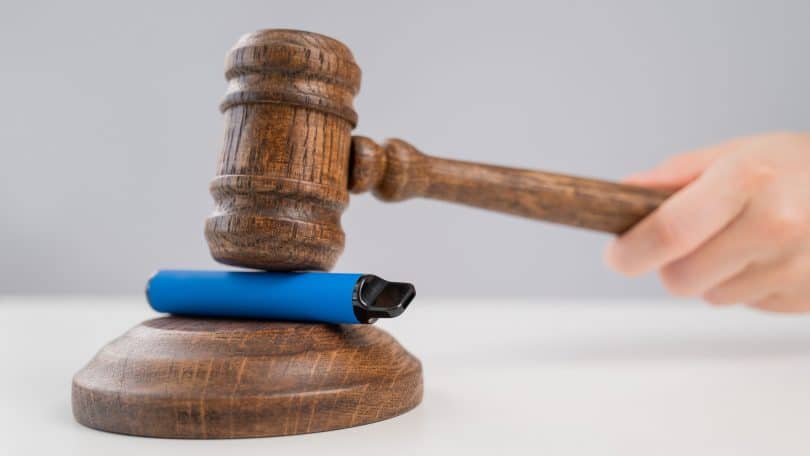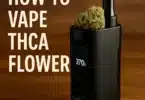E-cig maker Juul has really been a target in the last few years, with tons of lawsuits and government actions sent its way. In the newest story, Juul signed a settlement for a case that sees it paying out hundreds of millions to six different states (plus DC). How much sense does this make? Or is Juul just a scapegoat?
The Juul settlement
This most recent settlement Juul underwent, involves the states of New York, California, Massachusetts, New Mexico, Illinois and Colorado, plus Washington DC. Altogether, these locations will be paid $462 million. New York is set to receive $112.7 of this, but over an eight year period, and the money must be used for programs to keep kids from using e-cigs. California will get $175.8 million, specifically for e-cig research purposes, education, and legal enforcement.
The Massachusetts share is $41.7 million, and part of that goes to pay for vape addiction services. Colorado gets close to $32 million, New Mexico is to be paid out $17 million, and Washington D.C. receives approximately $15 million. While not stated in the reference article, its expected that Illinois would get the remaining $67.8 million.
The announcement came on Wednesday April 12th by five different attorney generals for the states in question. While Juul has had to deal with many lawsuits, this case marks the largest multi-state settlement the company has thus far entered into. All told, Juul has settlements with 45 states, for a total of about $1 billion.
Cool that you’re here. We’ve got the Cannadelics Weekly Newsletter for you to stay updated; and which comes with a load of offers for cannabis buds, vapes and smoking equipment, edibles, cannabinoid compounds, amanita mushroom products, and a boatload more. It’s good to feel good. Let’s all do it!
Beyond payouts to the states (and DC) the lawsuit also works to put limits on how Juul can sell and market its products; part of which involves placing products behind store counters, and verifying the age of buyers. Said New York Attorney General Letitia James, “There is no doubt that Juul played a central role in the vaping epidemic today. Juul is paying for widespread harm caused and will undergo severe restrictions on its marketing and sales practices.”
Juul’s response through a spokesperson was that the company is now closer to “total resolution of the company’s historical legal challenges and securing certainty for our future.” And that “Now we are positioned to dedicate even greater focus on our path forward to maximize the value and impact of our product technology and scientific foundation.”
According to its spokesperson, the company’s main priority is to obtain an authorization through the FDA to be able to legally market its products in the US. The authorization is through the Premarket Tobacco Product Applications, for which the FDA already turned the company down last June. A month later, that decision as put on hold, and subsequently dropped, making it potentially possible in the future.
Did Juul products cause a lot of deaths and injury?
You’d think from this settlement that Juul must have really caused some damage. I mean, there’s got to be a body count, right? That’s the thing, there isn’t. In fact, there’s not one death attributable to the company, and far as I can find, not one direct story of injury either. Isn’t this reminiscent of harsh cannabis laws that paint the plant as the worst, most-dangerous thing ever…even without death and injury attached?
The suits aren’t actually over death and injury, because there isn’t one confirmed case of either. Not one. In fact, all cases are over marketing the cigarette alternatives to minors. Nicotine products are illegal to market to children, so this includes Juul’s non-cigarette vapes. Legally this makes sense, as Juul must follow the same laws as tobacco companies under current regulation. Maybe it doesn’t make rational sense in terms of the ability of death and injury between the two (cigarettes vs vapes), but its fair play to expect the company to follow the laws in place, right?
Well, here’s another thing, Juul has apparently not advertised to kids in any way since 2019. Plus, the company also related that since that time, (when it also discontinued some flavors), use of Juul products by underagers dropped by 95%.
Despite the fact there aren’t official injury reports for any minor or adult related to the products, and an effort by the company to be in line with regulation, James made the statement that Juul is: “Taking a page out of big tobacco’s playbook” and that “Juul misled consumers about the health risks of their products.” She points out that the settlement will require Juul not use anyone less than 35 years of age in advertising if the ad can be seen by underagers.
Let’s get realistic – why literally none of this makes sense
Thus far, Letitia James is doing great at exemplifying grave misunderstandings about this topic. Something made clear when she said that Juul misled people to believe that the e-cig products are safer than cigarettes; pointing out that some vape pods have as much nicotine as a pack of cigarettes. The problem with this statement? They are less dangerous. Like, by leaps and bounds.

You see, 480,000 people in the US die a year from cigarette smoking, whereas Juul is not associated with a death count or injury count at all. Just the fact that vaping doesn’t involve lighting something on fire and breathing it in, means its automatically safer, so long as bad additives aren’t used. How many actual vape injury deaths? As of February 2020, from the inception of vaping until that point, not more than 68 deaths. Pretty much all related to added chemicals, which are not directly related to the act of vaping; and can be regulated out.
And that’s the whole argument against vaping that exists…that bad chemicals can be used. In fact, when the CDC talks about ‘vape injury’, that’s what its talking about, the injury that comes out of bad additives, like vitamin E acetate. Yet, these are almost always associated with black market products, and can be simply eliminated through regulation. They have 0% to do with vaping nicotine over smoking it, or vaping nicotine at all.
So, no actual safety issues are technically associated with the company. What is directly associated with the company, is helping people stop smoking. Smoking is the thing that can not only kill people, but which also takes out approximately 41,000 people a year through secondhand smoke. Funny, haven’t heard many complaints about secondhand vape damage…
Let’s make it even more ridiculous. Juul can’t use anyone under 35 in advertising, nor market anything that might be seen by an underager. Does that apply to alcohol too? It must, right? I mean, alcohol is also illegal for underage kids, and is also attached to a massive death and injury toll. Just like smoking, it hurts those that don’t partake, through actions like drunk driving. Yet…there are commercials on TV for alcohol, and billboards everywhere, and pages in magazines full of ads. That’s because alcohol ads don’t have to be approved for either print or broadcast. What do the five attorney generals think of that?
And for that matter, what about the UK now promoting vaping over smoking? To the point of a plan to hand out vape materials to smokers in order to get them to stop. Is this because vaping is just as dangerous as smoking? What do the attorney generals say in regards to that policy?
Let’s let some logic in
#1, and I really can’t stress this enough; does it matter if kids are marketed to if the product in question (vapes) can keep them from using the actually deadly product (cigarettes)? Shouldn’t we desire this? It’s not like they’re not going to know what smoking is; its in every big TV show and movie. It’s in the houses they go home to, or the ones they visit. Its on every street corner. Is the government’s logic that kids should only know about smoking? Sounds like it.
#2, there are real problems to worry about, like opioids and alcohol, and actual smoking. According to a National Survey on Drug Use and Health for 2017, in just the age range 12-17, 770,000 kids misused opioids that year. Those are the drugs that killed close to 100,000 people in 2021. Want to guess what that number would be today, six years later, as the problem has only grown?
And what about the National Institute of Health (NIH) report that states in 2019, in the same 12-17 age group, 414,000 kids were diagnosed with alcohol use disorder. You know, the substance that kills 140,000 people a year? Including over 10,000 road deaths attributed to it in 2016 according to the CDC? And let’s not forget actual smoking. According to the CDC again, in 2019, about one quarter of middle school kids and a half of high school kids said they tried tobacco products; do we really prefer this entire number use cigarettes over vaping??

#3, and possibly most important for this specific story, there really aren’t death or injury statistics attached to Juul. That should matter. All this talk of vape injury isn’t related to the company specifically, so why should it constantly be associated? Literally, not one headline that directly implicates this specific company in any of the stories of vape injury. It’s literally not a part of it, but taking the fall entirely. Why?
That’s like if there’s a story of tainted milk by some small company, and then every milk producer is called out for having dirty products. Juul is gone at like it murdered children, but the reality is that not one thing has been pinned against it. Go ahead and check the internet. The most you’ll find in a search for ‘Juul deaths’ is vague talk of lung injury, with nothing directly associated to the company. It’s just similar products in that they’re vaped. Are all pills the same even if they look similar? Can a Tylenol pill and an Oxycontin get confused? Should we not take any pills because of this possibility?
#4, one last point. Like it or not, the FDA has continually stopped progress in getting people to stop smoking, while constantly promoting measures that will likely only promote cigarette use. For example, last year nicotine gummies were almost a thing, but then the government wiped it out before it could start.
Imagine that, a product that could get rid of the damage of smoking, yet the FDA decided it was roundly better to have people smoke. And on the other end? Biden introduced an idea to reduce nicotine in cigarettes, something that has shown people to smoke more, despite a handpicked study from 2015 that attempts to say otherwise.
And maybe that makes sense as cigarettes have become a government industry nearly everywhere. What do I mean? The government makes so much in tax money off the products, it eclipses the earnings of the manufacturers, making the government the main beneficiary of tobacco sales. Perhaps its simply not economically good for the US to do anything that will actually bring down smoking numbers.
Conclusion
Is this latest Juul settlement just another indication the company is being used as a scapegoat by the US, while it continues to push cigarette sales, and bar anything that can get in the way? You be the judge. But you might want to start that judgement by doing the search on death and injury associated. And then maybe do the same for cigarettes.
Hello everyone. Thanks for making it to Cannadelics.com; a news site in the independent realm, here to bring you the best in cannabis and hallucinogen reporting for today’s industry. Head out way frequently to stay aware of everything happening, and subscribe to the Cannadelics Weekly Newsletter, to ensure you’re never late to get a story.








The correct plural of attorney general is ‘attorneys general’. The adjective (general) modifies the noun (attorney). When transposing the words, it is more easily understood that the noun is pluralized. This results in ‘general attorneys’. Think of the poem ‘Old King Cole’, where he “..called for his fiddlers three…” or, ‘three fiddlers’, not ‘threes fiddler’. The incorrect usage, ‘attorney generals’, suggests that high ranking military persons are lawyers.